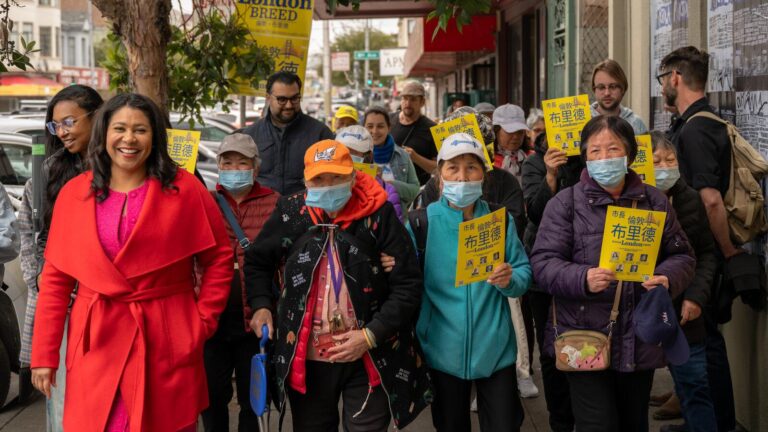In a notable political shift, San Francisco’s Asian American voters are increasingly distancing themselves from the Democratic Party, a trend that could reshape the city’s electoral landscape. Once a reliable Democratic stronghold, this diverse and growing community is expressing frustration over issues ranging from housing affordability to public safety and representation. As tensions mount ahead of upcoming elections, understanding the reasons behind this realignment is essential for grasping the evolving dynamics of San Francisco politics. This article explores the factors driving Asian American voters away from the party they have long supported, highlighting the implications for local and state races.
Shifting Political Loyalties Among San Francisco’s Asian American Communities
In recent years, a tangible realignment has been taking shape within San Francisco’s Asian American electorate. Many community members cite a growing disconnect with the Democratic Party’s approach to issues they consider critical—ranging from economic opportunity and education to public safety and immigration policy. This shift is particularly notable among younger voters and small business owners who feel that their voices are increasingly overlooked in local political debates. The once steadfast party loyalty is eroding as voters seek alternative platforms that promise pragmatic solutions over ideological rhetoric.
Key factors contributing to this trend include concerns about rising housing costs and perceived leniency on crime—issues that directly impact the daily lives of families across the city. Additionally, the sense of marginalization within broader minority coalitions has sparked a reassessment of political alliances. Below is a snapshot of top concerns influencing the voter shift:
- Economic Empowerment: Desire for policies supporting small businesses and entrepreneurship.
- Education Quality: Calls for improved school funding and culturally relevant curricula.
- Public Safety: Demand for more responsive law enforcement and community protections.
- Immigration Reform: Focus on streamlined legal pathways and integration support.
| Issue | Percentage of Concerned Voters |
|---|---|
| Housing Affordability | 68% |
| Local Crime Rates | 55% |
| Education System | 47% |
| Small Business Support | 42% |
Key Issues Driving Discontent With Democratic Leadership
Asian American voters in San Francisco have voiced growing frustration with what they perceive as a disconnect between Democratic leadership and the community’s evolving priorities. Central to this disenchantment is the party’s handling of public safety concerns, where many feel that rising crime rates and inadequate law enforcement responses are being overlooked in favor of progressive policy agendas. Additionally, economic pressures such as skyrocketing housing costs and small business challenges have pointedly affected this demographic, fueling a sense that their needs are no longer a focal point in political discussions or solutions.
Other significant factors contributing to this shift include:
- Educational policy reforms that some parents consider misaligned with their values
- Lack of effective communication between elected officials and diverse Asian American neighborhoods
- Perceived prioritization of identity politics over practical governance
| Issue | Community Impact | Democratic Party Response |
|---|---|---|
| Public Safety | Increased fear, reduced trust in law enforcement | Calls to reform policing, focus on social programs |
| Housing Affordability | Displacement of long-term residents, small business closures | Support for rent control, affordable housing initiatives |
| Education | Concerns over curriculum content and school resource allocation | Implementation of diversity and equity policies |
Impact of Policy Stances on Voter Engagement and Trust
San Francisco’s Asian American voters are increasingly expressing frustration with the Democratic Party‚Äôs approach to policies they consider central to their community‚Äôs well-being. Issues such as education reform, housing affordability, and public safety policies are perceived as being either inadequately addressed or misaligned with their priorities. This growing dissonance has led to a noticeable decline in voter engagement, with many feeling that their voices are sidelined in critical local decision-making processes. The resulting erosion of trust is reflected not only in dwindling voter turnout but also in a palpable skepticism toward candidates who fail to articulate clear stances on these issues.
Key factors contributing to this disengagement include:
- Perceived neglect of community-specific concerns: Policies on education and housing development are often viewed as favoring broader agendas at the expense of Asian American neighborhoods.
- Mixed signals on public safety: Calls for reform collide with fears around rising crime, creating confusion and mistrust.
- Lack of representation: Limited inclusion of Asian American leaders in policymaking dilutes the community’s influence.
| Policy Area | Community Concern | Impact on Voter Trust |
|---|---|---|
| Education | Overcrowded schools, curriculum relevance | High distrust due to perceived neglect |
| Housing | Affordability, gentrification | Moderate distrust; mixed responses |
| Public Safety | Rising crime, community policing | Strong influence on disengagement |
Strategies for Reengaging Asian American Voters in Future Elections
Efforts to reconnect with Asian American voters must begin with authentic dialogue that addresses the community’s diverse needs and concerns. Political parties should prioritize targeted outreach programs that go beyond traditional campaigning, integrating multilingual communication and culturally relevant messaging. Collaborations with local community leaders and organizations can create platforms for sustained engagement, fostering trust and demonstrating genuine investment in the issues that matter most, such as economic opportunity, public safety, and immigration policy.
Additionally, incorporating data-driven approaches to understand voter behavior and preferences within Asian American demographics is crucial. Below is a simplified overview of strategic focal points that can guide future campaigns:
| Strategy | Key Action | Expected Impact |
|---|---|---|
| Multilingual Outreach | Produce materials in native languages | Wider accessibility and inclusion |
| Community Partnerships | Engage local leaders and groups | Builds grassroots trust |
| Policy Focus | Address immigration and housing | Resonates with immediate concerns |
| Youth Engagement | Use digital platforms and events | Mobilizes younger voters |
The Way Forward
As the political landscape continues to shift, the growing disaffection among San Francisco’s Asian American voters signals a significant challenge for the Democratic Party. Understanding the nuanced concerns driving this trend will be essential for any campaign seeking to engage and address the priorities of this increasingly influential electorate. The evolving dynamics within this community underscore the importance of inclusive dialogue and responsive policymaking as the city moves forward.




